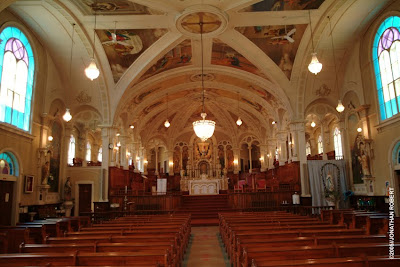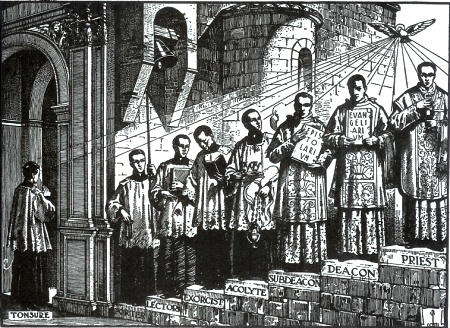The Cenacle is planning renting larger property for use as a temporary monastery. However, this depends on the generousity of others. More funds means this can be achieved, and even beginning may be made on a permanent monastery. Cheques can be sent to Fr Kirby at the address below.
~~*~~

The foundation of the Benedictine Monastery of
Our Lady of the Cenacle in the Diocese of Tulsa, Oklahoma is a timely response to the Year of the Priesthood. The following notes present something of the vision for this new monastery under the Rule of Saint Benedict. Please address all inquiries to Father Mark at the address given below.
IF YOU ARE LOOKING FOR LIFE IN ABUNDANCE"
I came," says Our Lord Jesus, "
that they may have life, and have it abundantly." (John 10:10)
--
A LIFE THAT IS MONASTIC"
One thing is needful." (Luke 10:42)
• under the Holy Rule of Saint Benedict and the guidance of the Father of the monastery.
• in the school of the service of the Lord.
• in obedience, the love of silence, and humility.
• in the joy of the Holy Spirit.
--
A LIFE THAT IS EUCHARISTIC AND SACERDOTAL"
I have earnestly desired to eat this Passover with you before I suffer." (Luke 22:15)
"
And for their sake I consecrate myself, that they also may be consecrated in truth." (John 17:19)
• the Holy Sacrifice of the Mass: the sun illuminating each day.
• daily prolonged adoration, on behalf of all priests, before the Eucharistic Face of Jesus, close to His Open Heart.
• in reparation for offenses committed against the Most Blessed Sacrament, and for the indifference of those who forsake Him, Who waits for us in the tabernacles of the world.
• in thanksgiving for the mercies that ever flow from the Eucharistic Heart of Jesus.
--
A LIFE THAT IS OFFERED AND CONSECRATED"
I appeal to you therefore, brethren, by the mercies of God, to offer your bodies as a living sacrifice, holy and acceptable to God, which is your spiritual worship." (Romans 12:1)
• for the sanctification of priests and the spiritual renewal of the clergy in the whole Church.
• in reparation for the sins that disfigure the Face of Christ the Priest.
• in the sacrificial love that is inseparable from the gift and mystery of the priesthood.
--
A LITURGICAL LIFE"
I give you thanks, O Lord, with my whole heart; in the presence of the angels I sing your praise." (Psalm 137:1)
"
O worship the Lord in the beauty of holiness." (Psalm 28:2)
"
Through Him then let us continually offer up a sacrifice of praise to God." (Hebrews 13:15)
• Holy Mass and the Divine Office celebrated in Gregorian Chant.
• bringing to the traditional forms of the sacred liturgy a diligence and beauty worthy of the Holy Mysteries.
--
A LIFE WITH OUR LADY, THE BLESSED VIRGIN MARY"
When Jesus saw His mother and the disciple whom He loved standing near, He said to His mother, 'Woman, behold your son!' Then He said to the disciple, 'Behold your mother!' And from that hour the disciple took her to his own home." (John 19:26-27)
• following in the footsteps of Saint John the Apostle who, obedient to the word of Jesus crucified, took Mary into his home and into the intimacy of his priestly heart.
• communitarian and personal consecration to the Virgin Mary.
• commemoration of the Mother of God at all the liturgical Hours.
• Holy Rosary daily.
--
A LIFE THAT IS ECCLESIAL AND APOSTOLIC"
In the Church and in Christ Jesus to all generations." (Ephesians 3:21)
• heeding the Supreme Pontiff, our Holy Father, the Successor of Peter.
• in filial obedience to the Bishop of the Diocese of Tulsa, Oklahoma.
• in generous service of the clergy by means of hospitality given to priests, deacons, and seminarians for days of silence and adoration, for retreats, and for spiritual direction.
• promoting Eucharistic adoration in the diocese of Tulsa.
• direction of the movement for spiritual motherhood benefiting priests.
--
A LIFE OF WORK"
Now there are varieties of gifts, but the same Spirit; and there are varieties of service, but the same Lord, and there are varieties of working, but it is the same God who inspires them all in every one." (1 Corinthians 11:4-7)
• hospitality to priests, deacons, and seminarians.
• spiritual care and support of the clergy.
• both manual and intellectual work, according to the abilities and gifts of each one.
--
A LIFE THAT INCORPORATES DIVERSE EXPRESSIONS WITHIN A SINGLE FAMILY"
If all were a single organ, where would the body be? As it is, there are many parts, yet one body. The eye cannot say to the hand, 'I have no need of you,' nor again the head to the feet, 'I have no need of you.'" (1 Corinthians 11:19-21).
• choir monks dedicated to the integral service of the liturgy and, normally, destined for the priesthood.
• monks not destined for the priesthood who, imitating Saint Joseph, dedicate themselves to the ceaseless prayer of the heart in the daily tasks entrusted to them.
• diocesan priests, Missionary Adorers of the Eucharistic Face of Jesus, sacerdotal Oblates of the monastery, living its charism and sustained by the monastic community in the midst of their pastoral labors. The Missionary Adorers, while remaining incardinated in their respective dioceses, will live according to the Statutes approved by the Bishop of Tulsa.
• deacons and laymen, single and married: secular Oblates of the monastery.
• women Oblates dedicated as Spiritual Mothers for Priests, following the initiative of the letter of 7 December 2007 of His Eminence, Claudio Cardinal Hummes, Prefect of the Congregation Pro Clericis.
The monastery will provide these women with a suitable initial and ongoing spiritual formation.
--
ADORERS OF THE EUCHARISTIC FACE OF JESUS"
You have said, 'Seek my Face.' My heart says to You, 'Your Face, O Lord, do I seek.' Hide not your Face from me." (Psalm 26:8-9).
"
It is the God who said, 'Let light shine out of the darkness,' who has shone in our hearts to give the light of the knowledge of the glory of God in the Face of Christ." (2 Corinthians 4:6).
• all participate daily in adoration of the Most Blessed Sacrament in the monastery, or for priest, deacon, and lay oblates, in their parishes
--
MONASTIC FORMATIONFor Catholic men between the ages of 18 and 35.
Postulancy: 3-6 months
Novitiate: 2 years
Temporary Vows: 3 years
Monastic Consecration after 5 years
~~*~~
Please send your contributions toward building the Eucharistic Cenacle to:
Reverend Dom Mark Daniel Kirby, O.S.B.
1744 South Xanthus Avenue
Tulsa, Oklahoma 74104-5324
Telephone: 918-749-0995
E-mail: cenacle at sbcglobal.net
Thank you for your generosity. May Our Lord Jesus Christ make the light of His Eucharistic Face shine upon you.
 On January 10, 2010, the Bishop of Copenhagen, Czeslaw Kozon, assisted by the clergy of his diocese and by members of the FSSP (including Fr. Josef Bisig), will offer a Solemn Pontifical Mass from the throne. He will offer the Mass in his own cathedral, St. Ansgar's, in Copenhagen. This will be the first Solemn Pontifical Mass according to the 1962 Missal in the Scandinavian region since the liturgical reforms.
On January 10, 2010, the Bishop of Copenhagen, Czeslaw Kozon, assisted by the clergy of his diocese and by members of the FSSP (including Fr. Josef Bisig), will offer a Solemn Pontifical Mass from the throne. He will offer the Mass in his own cathedral, St. Ansgar's, in Copenhagen. This will be the first Solemn Pontifical Mass according to the 1962 Missal in the Scandinavian region since the liturgical reforms.































